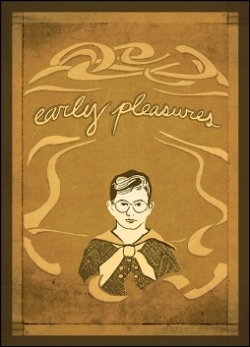Early Pleasures
Memoirs of a Sensual Youth
It is rare that a book is palatable like a well-sauced scaloppini that demands to be enjoyed slowly, bite by bite. Early Pleasures by Frederick Kohner is such a book. Kohner was born in Bohemia in 1905 in a family and place that, apparently, valued beauty in art, poetry, and learning. He was a superb story teller and gifted in the use of language. Ultimately, he proved himself a man in touch with youth, for he was also the author of the Gidget novels that were turned into hit movies in the 1970s.
Early Pleasures is a fictionalized memoir of a young man coming of age in Bohemia and, later, in Vienna and Paris during the first decades of the twentieth century. The backdrop is the end of World War I and the Austro-Hungarian Empire. Yet Kohner concentrates with sensitivity and profound insight on the toils of an adolescent learning the ways of the world, especially where love and sex is concerned. The boy’s story is told in four episodes, each episode an encounter with a different woman.
The first, Fraulein Hilde, is a member of the household staff and governess to his younger brother. Hilde went unnoticed until the youth was introduced to the concept of women as sexual objects by an older man living with the family. Once discovered, the young man was overcome: “Good, sweet, Madonna-like Hilde was a woman! Gorgeous, desirable, beguiling. The discovery almost undid me.” But Hilde was but a brief stop on the passage to adulthood.
The second woman, Countess Claudia Kinsky, is a school chum and a self-proclaimed sexual aficionado anxious to play the role of instructor. Unfortunately, their summer of passion is truncated by interference from Claudia’s Jew-hating brother, Stefan. Claudia remained unattainable: “If it is true that the whole of life is nothing other than a search for the fulfillment of the dreams of our youth, then my life has been nothing but a search for the love I had lost.”
The collapse of his relationship with Countess Claudia closes the door to one school but opens the door to new adventures in Vienna. The pace of life increases there, bringing with it an episode with an emotionally distraught servant girl and, later, while living in Paris, an intense sexual relationship with a Russian woman.
Throughout, the author exudes a youthful zest for life. Reflecting on the women with whom he has been involved, he concludes: “I cannot picture any one of them dead. They live on in that enchanted land called youth where nothing ever dies, not even we ourselves.” Frederick Kohner died in 1986.
Reviewed by
John Michael Senger
Disclosure: This article is not an endorsement, but a review. The publisher of this book provided free copies of the book and paid a small fee to have their book reviewed by a professional reviewer. Foreword Reviews and Clarion Reviews make no guarantee that the publisher will receive a positive review. Foreword Magazine, Inc. is disclosing this in accordance with the Federal Trade Commission’s 16 CFR, Part 255.

